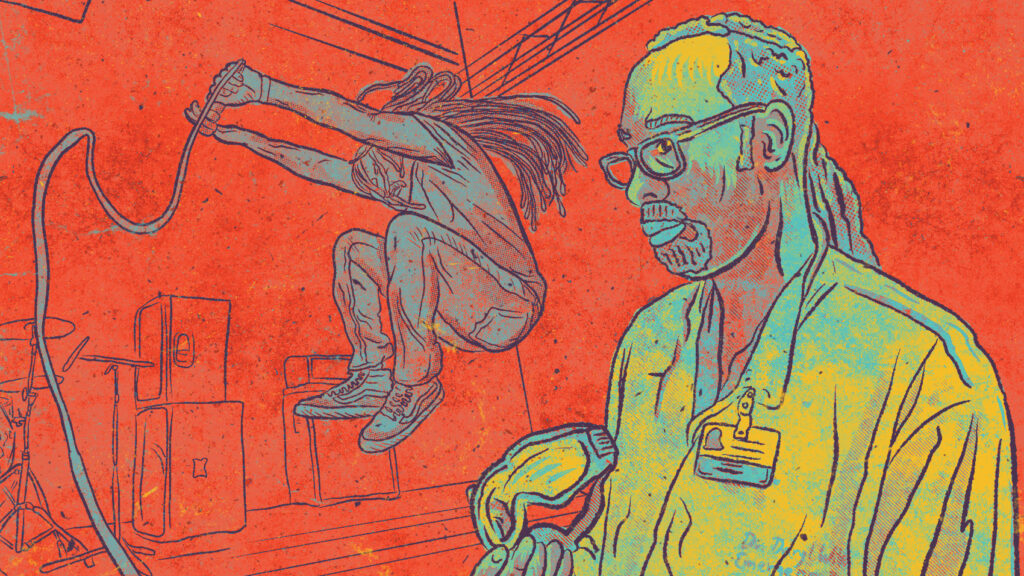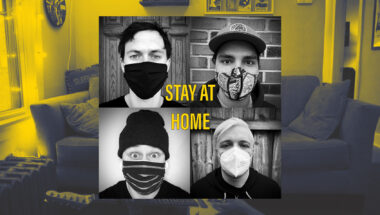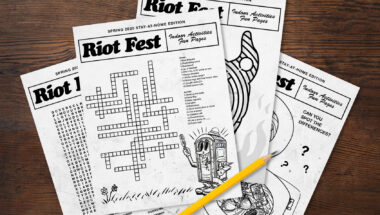Daryl Wilson’s best known to Chicago punk fans as the high-kicking longtime frontman for the legendary Bollweevils, but for the past two decades his main gig has been in the ER. As director of emergency medical services at Edward Hospital in Naperville, he’s currently on the front line of Illinois’s coronavirus outbreak, overseeing a critical point in the local healthcare infrastructure that’s being pushed to its very limits.
We caught Daryl during a rare moment of downtime at home with his family to ask him about what his job’s like right now, what we can all do to help make it easier, and how he uses skills he picked up in the punk scene to help tackle a pandemic.
RIOT FEST: I want to talk to you about what’s going on and what you’ve seen, and a little about the role music plays in what you do, if that’s not a totally silly question.
DARYL WILSON: I’m an emergency physician. I’ve been doing this for, jeez, god, let me think… I graduated medical school back in ‘96? And started my residency in ‘97. So since ‘97? And I’ve been an attending physician for 20 years.
Right now the experience is we’re taking care of lots of people who are sick right now. They’re gonna get sicker. You know, people coming in with their respiratory difficulty. We’re taking care of lots of people who are afraid, who may not be that sick, who put us all at risk for exposure. Which then translates into those of us on the front line having some trepidation and fear as well. We sign up for this, and we understand that there’s always risk associated with what we do—and right now, it comes so palpable that there’s this specter out there that could easily make you sick and take you off the board.
Yeah, the odds are that you’re going to be well, but there’s still a percentage of folks who aren’t. Those of us on the front lines are at higher risk of exposure over time. It’s a time of fear for a lot of people. I’m a Stoic about a lot of stuff. I don’t fear what we’re going through, because you have to take the whole idea of memento mori, the idea of, “remember you will die.” This is the truth. All of us are going to die one day, and we don’t know when that’s going to happen, so we have to just live. We have to learn to live and realize that we HAVE to live every day.
A part of my living every day is, number one, taking care of other people, but, number two, making sure my family and my friends understand that I care about them and that I’m there for them, and that we take every moment and we make it good. We cherish every moment. I guess you could incorporate music into that. Music is always a part of your life. It’s always a part of my life. Those moments where you have a song that hits you emotionally, that brings about memories of times that are always circulating through your day in some way. Or music that motivates you to take on the day. Music has always been a part of the banner that people use to march into battle. I listen to music every time I go onto a shift.
I feel like, with health care workers and first responders, we just assume that they’re going to be there when we need them, to basically be stronger than us, when I’m sure it’s a scary situation for them too.
Everybody thinks of us in this fantasized way because we have these prototypical careers that can be put into these dramatic presentations in film and TV and books, and people don’t realize that we’re real people. We have the same fears, and the same flaws, and the same foibles and triumphs that everybody else has. We have families. It’s sometimes interesting when you hear patients talk about, “I couldn’t get a hold of my doctor! I can’t believe they’re on vacation!” Of course they’re on vacation! You can’t work 24 hours a day, seven days a week, three-sixty-five. That’s impossible! No one could do that! But we’re put into this almost superheroic light. Which is cool in some sense, in the fantasy way, but the reality is, we fail and we break. We mentally have to recharge. Especially when you’re doing what I do in the emergency department, where you’re dealing with individuals at their worst, in high stress situations, emotionally charged situations. You can’t just take that all on. You have to find ways to try to offload that.
I found that healthy way by being in The Bollweevils—you know, jumping around on stage and screaming about crap. Everybody has to offload in the best way that they can. And that’s not always possible. Sometimes the onslaught is too much. This is why there’s so much burnout in the medical professions. It’s our calling. We’re in a battle with this scourge that’s trying to take out humanity. And it’s not gonna take us out! It’s just a part of what the Earth does.
We are unfortunately going to have people who will die from this. People are going to be very, very sick from this. And we have to be that line in the sand that says, “You don’t cross this.” And it’s hard! Some people break. We are fragile like anyone else.
As someone who’s putting their health and wellbeing, and potentially life, on the line, how does it feel when you see photos of, like, crowds of people running on the 606?
I mean, it’s easy to become angry. The Stoic philosophy, once again, points out that in truth, you’re gonna run into assholes every day. And if you realize and understand that’s gonna happen, when you run into assholes it shouldn’t be surprising at all. So I’m not surprised that people are that inconsiderate and don’t look at the risk that they not only put themselves at, but other individuals. Because people don’t think anything’s real until it affects them personally. People can look at racism, they don’t think it’s real until something happens to someone they know. Or they may not think hunger exists because they don’t ever see hunger. And that’s crazy. People have to open their minds up to the realities that are really around them, and not live in their bubbles all the time.
When you see individuals who are blatantly putting others at risk…they might not see the effects of this. You’re all crowded together but you don’t get sick. Good! You’re in the 80 percent who don’t get sick. But then you infect someone else and they don’t get sick, so good for them, but they have an immunocompromised person at home or they have an elderly parent at home or they have an unlucky spouse or friend or someone who gets ill and ends up on a ventilator. People can be assholes. That’s the problem. The thing about this kind of disaster, in everybody’s mind the apocalypse comes and it’s like mutants roaming the wasteland, all those kinds of things that you see. You can still go places. You still have food and water. People still have electricity and can stream whatever they want. So it’s the most convenient inconvenience around, but nobody sees it that way. So they basically flaunt, “Well, I can do whatever the hell I want because I can, because it doesn’t affect me personally.”
You’ve been talking about people feeling scared, particularly the ones who are coming into the ER who aren’t sick but are afraid they are…
First of all, those people shouldn’t come to the ER at all. If you’re not short of breath, if you’re not having air hunger, don’t come to the ER. If you have a fever, take some Tylenol. If you have body aches, take some Tylenol. If you’re feeling fatigued, you need to sleep. Social distance from your family, wear a mask, wash your hands, don’t touch your face. If you are not sick… I’m talking needing hospitalization, you don’t need to be in the ER. We can’t have you there. We need the bed space. We need all of our resources to be concentrated on the truly sick. That’s the bottom line.
People really need to start analyzing what’s really necessary, because we’re going to have to analyze what’s necessary as well, when it comes down to resource allocation. If it comes down to choosing individuals that have to be vented or not, that’s going to be a hard choice but we’re going to have to make those choices. And we don’t want to have to do that. If we can have more resources available because people are smart enough to realize they don’t need to use it up right now, that helps everybody.
Seeing our healthcare system pushed to its limits really brings home the fact that there are limits. A lot of people can’t seem to wrap their heads around the fact that there wouldn’t be enough ventilators for everyone during this outbreak. Do you think that this experience is showing people a side of the healthcare system that perhaps only people like yourself who work inside of it have seen before? And do you think this will change people’s perceptions of the system?
Well yeah, it has to change the perception of it. Once again, the outsider’s view of the healthcare system is that it’s an abundance of resources that are available all the time, 24 hours a day, seven days a week. The differences between hospitals located in critical access areas, or rural hospitals versus suburban hospitals versus some city hospitals, and look at the resources that are available… You can go to different parts of the country and realize that there are big healthcare droughts in some areas. Where I live, I can throw a stone and hit a hospital that can take me to a cath lab if I have a heart attack, that has stellar orthopedic care, that has neurosurgeons available. I can go to Southern Illinois and find that there’s completely no access to a cath lab in a short period of time, and that me getting a stent placed as rapidly as necessary, within 60 minutes, that won’t happen because I’m just 80 miles south of where I live.
It’s amazing that it comes to a disaster such as this for people to realize that we may have some shortcomings with our resources for healthcare allocation. I think it has to make us really look at what our priorities are when it comes to the health of the people of our nation.
What other kinds of changes do you think will come out of this?
Everybody has to have an emergency fund, right? And no one seems to have that mentality built in… we’re a spendthrift society, and now we wish we had some kind of way where we could have built up an emergency fund so when our economy went to shit it didn’t just fall the fuck apart. We didn’t do that. We didn’t plan that way. We have to start looking at how we manifest emergency funding for things. I think fundamentally we’ll have to look at end of life care for people and really start discussing what we’re going to do. I don’t think that has to turn into a Logan’s Run kind of society. I hope not, because my crystal turned red a long time ago. Fundamentally we have to start looking at what our priorities are. There are other diseases coming in the future that we have to prepare for.
I wanted to circle back around to the people you were saying are coming into the ER because they’re more scared than sick. Do you have any advice for people who are feeling freaked out right now?
Fear is funny. It’s a force. It kind of propels you in a way. It’s like fire is a force too, right? Fire can be used to warm you or it can be used to burn something down. Fear is kind of like a fire in a way. It can swallow you up, or you can use it to fuel something else. Use that fear to say hey, where’s this fear coming from? What am I afraid of? What do I need to understand? Because fear comes from a lack of understanding of something. I think if people took the time to analyze where their fear comes from and find factual things to help allay their fears, and use that fear as something to build upon. If you sit back and cower in your fear, you’re never gonna actually overcome anything. But if you start to find that you understand things better, that you have the energy to maybe take on a different type of task at home.
Maybe you find that, “Oh, I don’t feel as healthy as you should, so maybe I should find ways to eat healthier. Maybe I should start working out.” Or maybe you find ways to try something new. Since this is a music thing, listen to music. Learn a craft. Learn a skill. Do something else with the energy. Don’t just sit back and let it devour you. Use that fire to illuminate your path.
You said something earlier about this sort of “live for the day” attitude that you have, which feels very punk rock to me. Is there shit from punk that you draw on in the situations you get in at the hospital?
Oh yeah, all the time. Emergency medicine is the most punk rock of all medical professions, I think. It’s rough and tumble. It’s performance. It’s got tragedy, it’s got pain, it’s got fun, it’s got craziness. It’s crazy! You see things you wouldn’t believe would happen to humanity, in punk rock as well as the emergency department. I love it. Punk rock is doing your thing. That’s the thing you wanna do. You wanna do it? Do that thing! Live your life, man. You don’t know when you’re gonna be taken off this planet. Whatever you do, do it now. Make the most of it. Right now, even though everything is shitty, you still have to feel alive. And I feel alive. Living life is to live life.
Is there anything else you want people reading this to know?
Yeah, people need to continue to social distance, [continue] hand washing. Don’t touch your face. If you are sick, like I said, take a Tylenol and stay away from your family and friends. Wear a mask so you’re not transmitting the disease. If you’re feeling good, don’t give it to somebody else and make them feel horrible. Don’t make them one of the twenty percent that’s going to require hospitalization, or the five percent that are going to require critical care, or the two percent that will die. Don’t be a vector. Also, don’t be afraid. It’s scary, but use that energy to gain knowledge, to help yourself become less fearful. And enjoy stuff. When you’re at home, listen to music. Listen to The Bollweevils.
Dr. Daryl Wilson has also shared with us a playlist of his favorite songs he’s using to pump himself up before shifts. We’ve added his picks to a playlist below:



